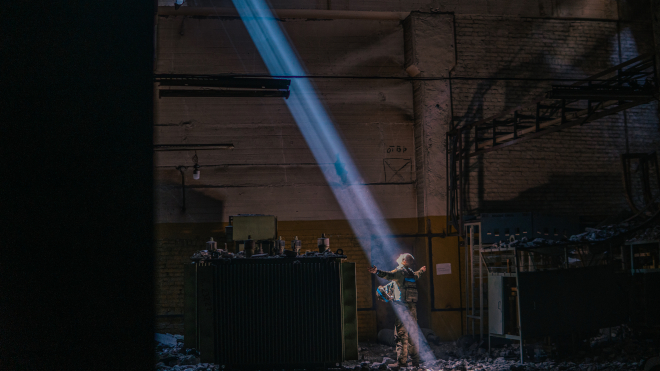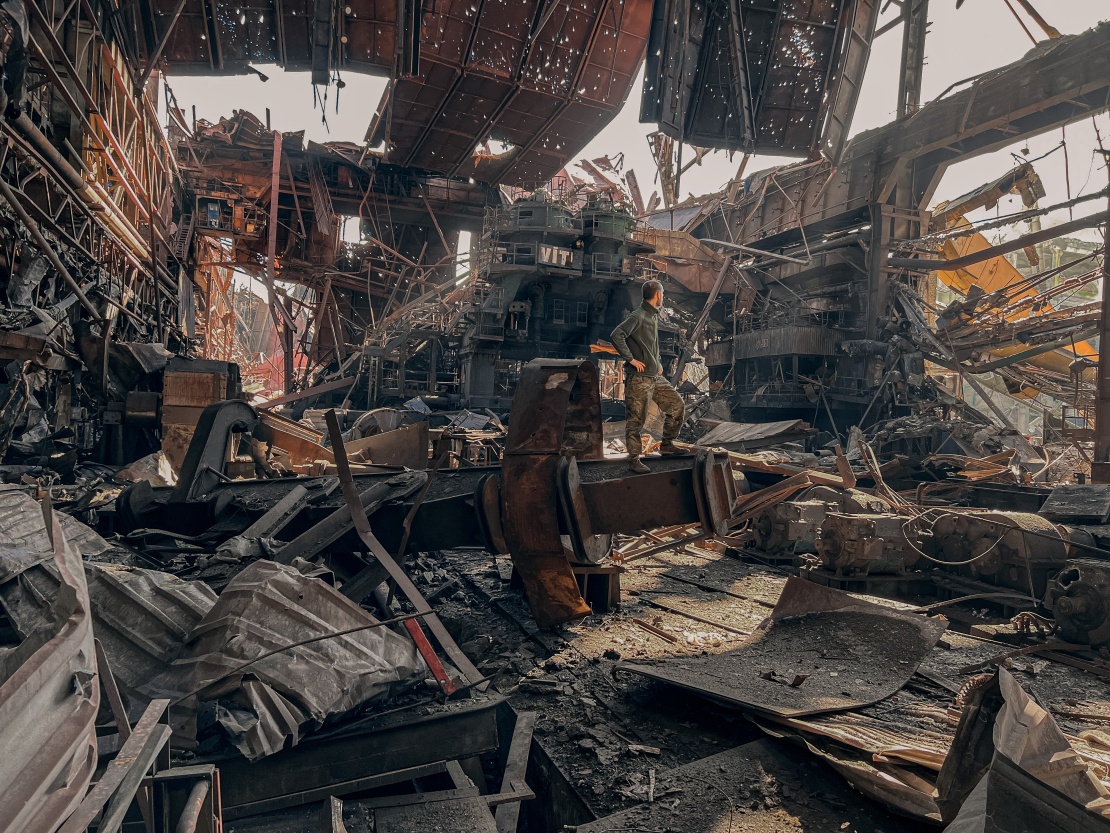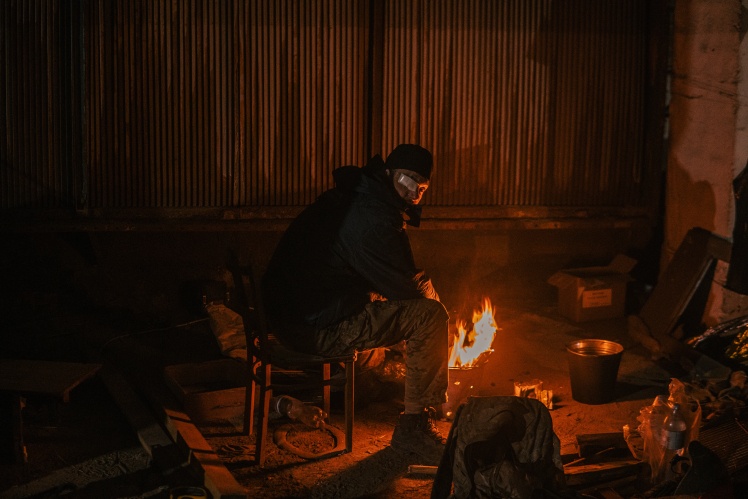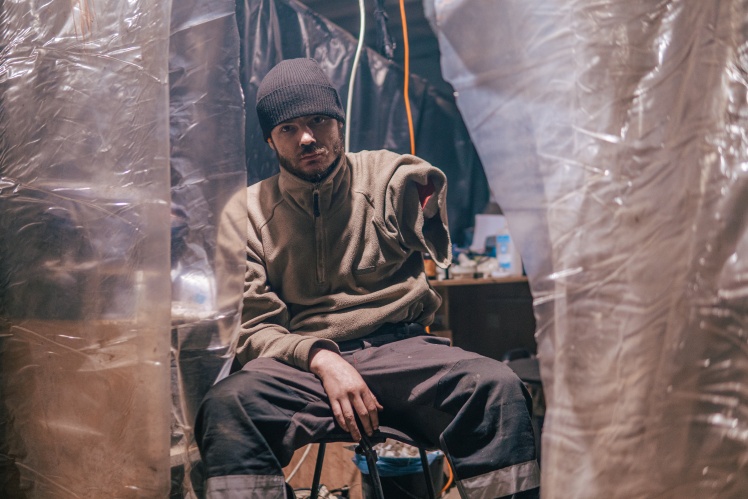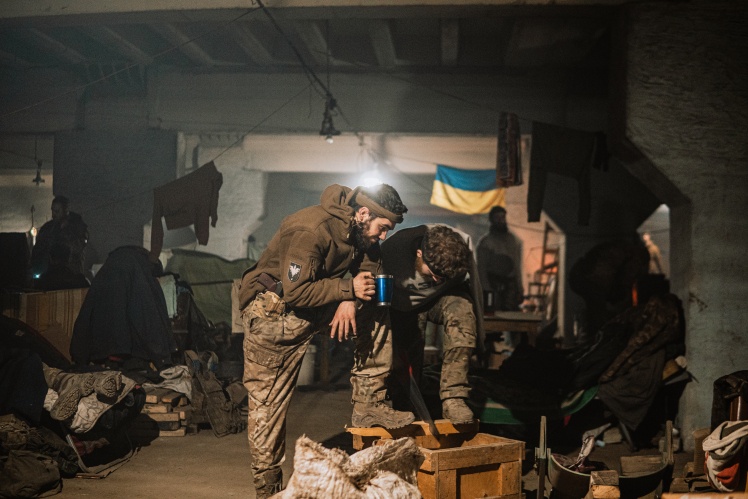What exactly happened?
The Russians are preparing to conduct a certain process against the defenders of Azovstal, which they call a tribunal. At the same time, it isnʼt known exactly who exactly will be put to the “trial”. The occupiers talk about Azovians, but they donʼt specify who they mean — only the fighters of Azov regiment or all the defenders of Azovstal, among whom were soldiers of various Ukrainian military units.
Militants started talking actively about criminal cases and the preparation of the tribunal when the Ukrainian military left the plant in Mariupol. The last defenders left the Azovstal territory on May 20, and already in early June, the head of the Investigative Committee of the Russian Federation, Oleksandr Bastrykin, came to occupied Mariupol. He oversees the "investigation of crimes" allegedly committed by the Ukrainian military. Bastrykin visited occupied Mariupol twice, held meetings with local "law enforcement officers" and listened to reports.
Fighter of the "Azov" regiment Dmytro Kozatsky (positive "Orest")
In July, Pushylin reported that "more than 100 Azov militarymen were transferred from places where prisoners of war are kept to detention centers. Some of them are going to be tried at a pseudo-tribunal. At first, he said that the trial would take place by the end of July. Now he promises that by the end of summer. The Mayor of Mariupol, Vadym Boychenko, stated that this could happen on August 24, on the Independence Day of Ukraine. They plan to make a show from the court. For this purpose, the Russian occupiers built iron cages in Mariupol philharmonic hall, in which Ukrainian prisoners of war will be kept. Their photos were published on June 6 by the Mariupol City Council, also there was a on the pro-Russian Telegram channel.
And who organizes the "tribunal"?
The creation of the "tribunal" is actively commented on by the leaders of pseudo-republics and Russian politicians. Bastrykin commented on which countries should be invited to the court. However, the Minister of Foreign Affairs of Russia, Sergei Lavrov, immediately declared that the "tribunal" was being prepared by pseudo-republics, not Russia. Though, “DPR” “leader” Denys Pushylin commented that they are doing this to fulfill Russian President Putinʼs task of "denazification". The separatists donʼt explain what "denazification" is, nor what it has to do with the pseudo-tribunal.
Why is this about Russia?
Russia and the pseudo-republics started talking about their own "tribunal" because Ukraine began active international legal activities almost immediately after the start of the full-scale invasion. Thus, the Russian president explained the invasion by the fact that Ukraine is committing genocide in Donbas. Already on February 27, the Ukrainian side sent a lawsuit against Russia to the UN International Court of Justice in The Hague, in which it insists that Putin manipulated and lied.
On February 28, the Prosecutor of the International Criminal Court, Karim Khan, announced that he had decided to start an investigation into the situation in Ukraine, and already on March 2, that the process had started. It was possible to do it so quickly because 39 member states of the ICC asked Khan to start an investigation of international crimes in Ukraine. The court can investigate the actions of the military and political leadership of Russia, including Putin, namely war crimes, crimes against humanity and genocide.
Prosecutor of the International Criminal Court, United Kingdom, Karim Khan (4th case) visits a mass grave in Bucha, April 13, 2022.
Getty Images / «Babel'»
On March 6, more than 50 Ukrainian public organizations appealed to the UN with the demand to create an international tribunal against Putin and the highest leadership of Russia for the crime of aggression. The initiative was supported by the Minister of Foreign Affairs of Ukraine, Dmytro Kuleba, and the expert on international law and former post-envoy of the president to Crimea, Anton Korynevych, became the ambassador on special assignments at the Ministry of Foreign Affairs. Now, in addition to representing Ukraine at the UN International Court of Justice, he is promoting the idea of a special tribunal and is negotiating with representatives of other countries.
Gyunduz Mamedov calls the pseudo-tribunal an attempt to discredit the very idea of the tribunal, which Russian high-ranking officials actually fear. As well as barbarism and demonstrative trials following the example of the Soviet Union.
Who is going to be judged?
It is not completely clear yet. Collaborators declare that they will judge the Azov. However, there were also statements that Ukrainian prisoners of war who served in other units would be brought to court.
On August 2 of this year, Russia hastily recognized Azov as a terrorist organization. Is it related to the upcoming judgment?
The fact that Azov regiment was recognized as a terrorist organization has two dimensions. The first is ideologcal: the Russians cynically try to justify "denazification". The second one is legal: they aim to influence the "trial process" [which is “organized” by the "DPR"] and deprive our defenders of the status of prisoners of war.
However, as Mamedov points out, such recognition in no way relieves Russia of its obligation to adhere to the Geneva Conventions and to treat our prisoners of war in accordance with them.
Fighter of the "Azov" regiment Dmytro Kozatsky (positive "Orest")
Russians call the "tribunal" an international one. Who will participate?
Itʼs hard to say yet. Pro-Russian collaborators reported that they had appealed to "many countries", including European ones, but they did not specify which countries they were talking about. They also asked North Korea to send its representatives, but it has not yet responded. Bastrykin proposed to involve Syria, Iran and Bolivia in the creation of the "tribunal". However, so far, according to the Donetsk collaborators, only Russia, Belarus and Syria have given their consent.
Can this be considered an international tribunal?
No. A tribunal can be established under international law. An international tribunal can be convened with the participation of the United Nations, which includes 193 states. It can be created by a decision of the UN Security Council, but it must be unanimous. This can also be done through a resolution of the UN General Assembly — it will recommend the UN Secretary General to sign an agreement with Ukraine on the establishment of a tribunal. Such an agreement can be signed with other organizations. For example, as Ukraine is trying to do, using the European Union, which includes 27 independent states, or using the Council of Europe, which includes 46 states.
Another option is a coalition of countries. But if there were only three states in the whole world that agreed to take part in this action, the international community would not trust its decisions. In addition, the countries that agreed to participate in the "pseudo-tribunal" are directly dependent on Russia. Belarus is building an allied state with Russia, from its territory the Russian Federation invaded Ukraine and is shelling it. Dictator Bashar Assad also still leads Syria only because Russia intervened in the civil war in the country on his side.
A demonstration against an attack by the Bashar al-Assad regime, Idlib, Syria, on August 21, 2013.
Getty Images / «Babel'»
Why is the "tribunal" over Azov members a war crime?
First, the so-called tribunal is a violation of the III Geneva Convention. Prisoners of war cannot be judged for their participation in hostilities. They can be tried exclusively for committing the most serious international crimes, which must be proven.
Secondly, such a tribunal must be legitimate, guided by the principles of the rule of law and fair trial. But the courts in the temporarily occupied territories cannot be considered as such. In addition, the Main Directorate of Intelligence of the Ukrainian Ministry of Defense reported that "the occupiers prepare specially trained "witnesses" and bring in representatives of the racist mass media to participate in the court."
We also judge the Russian military. What is the difference?
There is a fundamental difference between these courts. Our prisoners of war are going to be tried in an unrecognized quasi-state entity that does not have a legitimate system of law and justice. Such a court cannot be called a priori legitimate.
During the "trial", the Russians are going to keep our defenders on stage behind iron bars (Ukraine gave them up a long time ago). Is this acceptable?
Keeping suspects behind bars on stage is a violation of Article 3 of the Convention on the Protection of Human Rights and Fundamental Freedoms. But our prisoners of war will not be able to apply to the European Court of Human Rights because of this very violation. The problem is the relationship between international humanitarian law — that is, the law that regulates armed conflicts and human rights. During an armed conflict, certain human rights may be narrowed. For example, martial law partially limits them. However, some of them cannot be narrowed down even during war — these are the right to life, the right to a fair trial, the prohibition of torture, etc.
Protest action after the killing by the Russian military of a part of the prisoners of war of the Azov regiment on July 29, 2022 in the village of Olenivka, Donetsk region. Relatives and friends demand the release of the remaining prisoners of war. Lviv, July 31, 2022.
Getty Images / «Babel'»
So, if later Ukrainian prisoners of war want to appeal to the European Court of Human Rights about the violation of their rights, then it is worth talking about the violation of another fundamental article of the Convention on Human Rights — the right to a fair trial. The court must be independent, impartial, and most importantly, established by law. The court that is being prepared in Mariupol does not meet any of these requirements. Caging may be an additional factor and be considered inhumane treatment.
If this process does take place and a decision is made on it, will it be valid? And what will be the consequences for our military?
On the one hand, the decision of the "courts" of an unrecognized quasi-formation is null and void and has no legal consequences. On the other hand, the lives and health of our prisoners of war are at stake, because Ukraine does not influence the decisions of the "courts": they will be valid only on the territory of quasi-organizations, says Mamedov.
The occupation administrations manipulate the highest degree of punishment — they canceled the moratorium on the death penalty. It looks like political blackmail. Therefore, says Mamedov, Ukraine should declare an appropriate political and legal position, which will be supported by international partners and authoritative international organizations.
Will there be consequences for those who organized this court? And for whom exactly?
Of course, all involved representatives of the Russian occupation administration must bear responsibility, because such processes contradict both Ukrainian national legislation and international law.
Therefore, says Mamedov, the law enforcement agencies of Ukraine should start criminal proceedings against all the organizers and executors of the "trials". Including under Art. 438 of the Criminal Code of Ukraine — "Violation of the laws and customs of war." After all, the organizers and executors of such courts violate a basic right — the right to a fair trial, guaranteed by the Universal Declaration of Human Rights and the Geneva Conventions.
Fighter of the "Azov" regiment Dmytro Kozatsky (positive "Orest")
Translated from Ukrainian by Anton Semyzhenko.
We know why Russia and its puppets are war criminals. And we are ready to talk about it until the last one of them is punished. Support Babel: Patreon 🔸 [email protected]🔸donate in cryptocurrency🔸in hryvnia.
